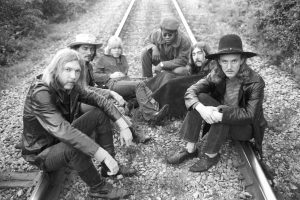 Recently I introduced you to Gospel Blues and three artists who defined the genre. Several prominent classic rock era musicians found inspiration in this music. Today I share with you three covers I believe you will find more familiar.
Recently I introduced you to Gospel Blues and three artists who defined the genre. Several prominent classic rock era musicians found inspiration in this music. Today I share with you three covers I believe you will find more familiar.
Nobody’s Fault but Mine
“It’s Nobody’s Fault but Mine” tells of a spiritual struggle, with reading the Bible as the path to salvation. or, rather, the failure to read it leading to damnation. Blind Willie Johnson first recorded the gospel blues song “Nobody’s Fault but Mine” in 1927.
The song has been interpreted and recorded by numerous musicians in a variety of styles, including Led Zeppelin in 1975.
Led Zeppelin recorded “Nobody’s Fault but Mine” for their seventh studio album Presence(1976). Adapted from Blind Willie Johnson’s song, the lyrics represent a more secular theme, with an electric rock music backing.
Critics compare “Nobody’s Fault but Mine” lyrics to Robert Johnson‘s “Hell Hound on My Trail“. Johnson’s 1937 Delta blues song tells of a man trying to stay ahead of the evil which is pursuing him. However it does not address the cause or lasting solution for his predicament. In Blind Willie Johnson’s “It’s Nobody’s Fault but  Mine”, the problem is clearly stated. He will be doomed, unless he uses his abilities to learn (and presumably live according to) biblical teachings.
Mine”, the problem is clearly stated. He will be doomed, unless he uses his abilities to learn (and presumably live according to) biblical teachings.
Led Zeppelin retain Blind Willie’s admission that he ultimately is to blame, but add Robert Johnson’s sense of despair. However, they shift the focus from religion to a more contemporary one. Their lyrics include “that monkey on my back”, a commonly used reference to addiction. And “the devil he told me to roll, how to roll the line tonight”. To overcome, Plant concludes “gonna change my ways tonight”.
Crossroads
“Cross Road Blues” (also known as “Crossroads“) is a blues song written and recorded by American blues artist Robert Johnson in 1936. Johnson performed it as a solo piece with his vocal and acoustic slide guitar in the Delta blues-style. The song has become part of the Robert Johnson mythology. Allegedly referring to the place where he supposedly sold his soul to the Devil in exchange for his musical talents. However the lyrics do not contain any specific references.
Bluesman Elmore James revived the song with recordings in 1954  and 1960–1961. English guitarist Eric Clapton with Cream popularized the song as “Crossroads” in the late 1960s.
and 1960–1961. English guitarist Eric Clapton with Cream popularized the song as “Crossroads” in the late 1960s.
Their blues rock interpretation inspired many cover versions. Furthermore the Rock and Roll Hall of Fame included it as one of the “500 Songs That Shaped Rock and Roll”. Also, Rolling Stone placed it at number three on the magazine’s list of the “Greatest Guitar Songs of All Time”.
Statesboro Blues
“Statesboro Blues” is a Piedmont blues song written by Blind Willie  McTell, who recorded it in 1928. The title refers to the town of Statesboro, Georgia. Scroll upTaj Mahal recorded a popular blues rock adaptation of the song in 1968. Rolling Stone magazine ranks the version by the Allman Brothers Band, #9 on its list of the “100 Greatest Guitar Songs of All Time”. Also, in 2005, the Atlanta Journal-Constitution ranked “Statesboro Blues” number 57 on its list of “100 Songs of the South”.
McTell, who recorded it in 1928. The title refers to the town of Statesboro, Georgia. Scroll upTaj Mahal recorded a popular blues rock adaptation of the song in 1968. Rolling Stone magazine ranks the version by the Allman Brothers Band, #9 on its list of the “100 Greatest Guitar Songs of All Time”. Also, in 2005, the Atlanta Journal-Constitution ranked “Statesboro Blues” number 57 on its list of “100 Songs of the South”.
